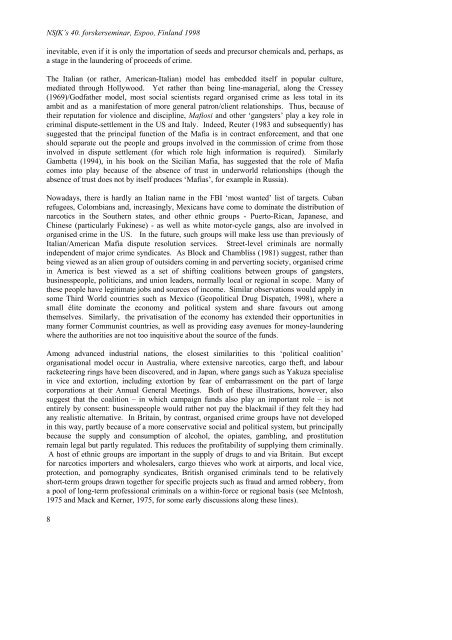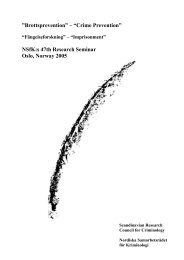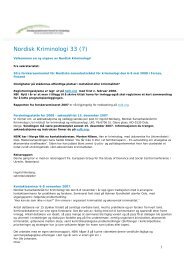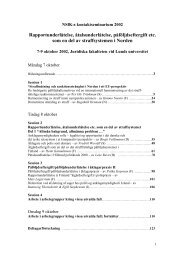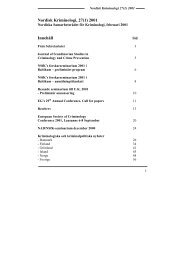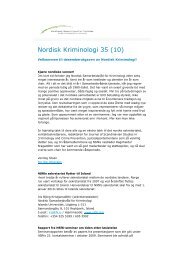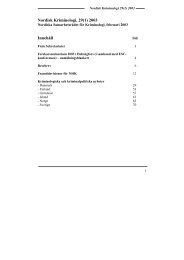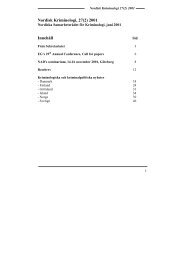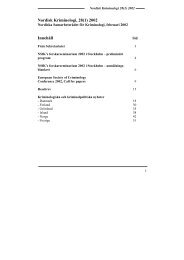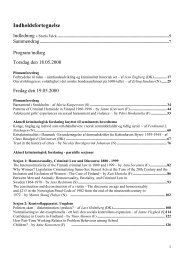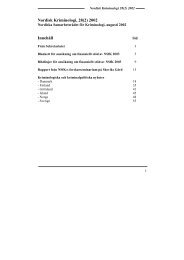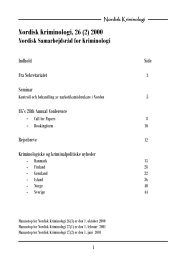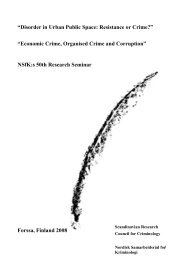Organised Crime & Crime Prevention - what works? - Scandinavian ...
Organised Crime & Crime Prevention - what works? - Scandinavian ...
Organised Crime & Crime Prevention - what works? - Scandinavian ...
You also want an ePaper? Increase the reach of your titles
YUMPU automatically turns print PDFs into web optimized ePapers that Google loves.
NSfK’s 40. forskerseminar, Espoo, Finland 1998<br />
inevitable, even if it is only the importation of seeds and precursor chemicals and, perhaps, as<br />
a stage in the laundering of proceeds of crime.<br />
The Italian (or rather, American-Italian) model has embedded itself in popular culture,<br />
mediated through Hollywood. Yet rather than being line-managerial, along the Cressey<br />
(1969)/Godfather model, most social scientists regard organised crime as less total in its<br />
ambit and as a manifestation of more general patron/client relationships. Thus, because of<br />
their reputation for violence and discipline, Mafiosi and other ‘gangsters’ play a key role in<br />
criminal dispute-settlement in the US and Italy. Indeed, Reuter (1983 and subsequently) has<br />
suggested that the principal function of the Mafia is in contract enforcement, and that one<br />
should separate out the people and groups involved in the commission of crime from those<br />
involved in dispute settlement (for which role high information is required). Similarly<br />
Gambetta (1994), in his book on the Sicilian Mafia, has suggested that the role of Mafia<br />
comes into play because of the absence of trust in underworld relationships (though the<br />
absence of trust does not by itself produces ‘Mafias’, for example in Russia).<br />
Nowadays, there is hardly an Italian name in the FBI ‘most wanted’ list of targets. Cuban<br />
refugees, Colombians and, increasingly, Mexicans have come to dominate the distribution of<br />
narcotics in the Southern states, and other ethnic groups - Puerto-Rican, Japanese, and<br />
Chinese (particularly Fukinese) - as well as white motor-cycle gangs, also are involved in<br />
organised crime in the US. In the future, such groups will make less use than previously of<br />
Italian/American Mafia dispute resolution services. Street-level criminals are normally<br />
independent of major crime syndicates. As Block and Chambliss (1981) suggest, rather than<br />
being viewed as an alien group of outsiders coming in and perverting society, organised crime<br />
in America is best viewed as a set of shifting coalitions between groups of gangsters,<br />
businesspeople, politicians, and union leaders, normally local or regional in scope. Many of<br />
these people have legitimate jobs and sources of income. Similar observations would apply in<br />
some Third World countries such as Mexico (Geopolitical Drug Dispatch, 1998), where a<br />
small élite dominate the economy and political system and share favours out among<br />
themselves. Similarly, the privatisation of the economy has extended their opportunities in<br />
many former Communist countries, as well as providing easy avenues for money-laundering<br />
where the authorities are not too inquisitive about the source of the funds.<br />
Among advanced industrial nations, the closest similarities to this ‘political coalition’<br />
organisational model occur in Australia, where extensive narcotics, cargo theft, and labour<br />
racketeering rings have been discovered, and in Japan, where gangs such as Yakuza specialise<br />
in vice and extortion, including extortion by fear of embarrassment on the part of large<br />
corporations at their Annual General Meetings. Both of these illustrations, however, also<br />
suggest that the coalition – in which campaign funds also play an important role – is not<br />
entirely by consent: businesspeople would rather not pay the blackmail if they felt they had<br />
any realistic alternative. In Britain, by contrast, organised crime groups have not developed<br />
in this way, partly because of a more conservative social and political system, but principally<br />
because the supply and consumption of alcohol, the opiates, gambling, and prostitution<br />
remain legal but partly regulated. This reduces the profitability of supplying them criminally.<br />
A host of ethnic groups are important in the supply of drugs to and via Britain. But except<br />
for narcotics importers and wholesalers, cargo thieves who work at airports, and local vice,<br />
protection, and pornography syndicates, British organised criminals tend to be relatively<br />
short-term groups drawn together for specific projects such as fraud and armed robbery, from<br />
a pool of long-term professional criminals on a within-force or regional basis (see McIntosh,<br />
1975 and Mack and Kerner, 1975, for some early discussions along these lines).<br />
8


